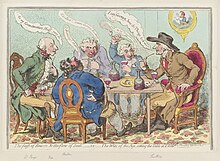


Wit is a form of intelligent humour—the ability to say or write things that are clever and typically funny.[1] Someone witty is a person who is skilled at making clever and funny remarks.[1][2] Forms of wit include the quip, repartee, and wisecrack.
As in the wit of Dorothy Parker's set, the Algonquin Round Table, witty remarks may be intentionally cruel (as also in many epigrams), and perhaps more ingenious than funny.
Aquip is an observation or saying that has some wit but perhaps descends into sarcasm, or otherwise is short of a point. A witticism also suggests the diminutive.
Repartee is the wit of the quick answer and capping comment: the snappy comeback and neat retort.
Metaphysical poetry as a style was prevalent in the time of English playwright William Shakespeare, who admonished pretension with the phrase "Better a witty fool than a foolish wit".[3] It may combine word play with conceptual thinking, as a kind of verbal display requiring attention, without intending to be laugh-out-loud funny. Indeed wit in verse can be a thin disguise for more poignant feelings. English poet John Donne is the representative of this style.[4]
More generally, one's wits are one's intellectual powers of all types. Native wit—meaning the wits with which one is born—is closely synonymous with common sense. To live by one's wits is to be an opportunist, but not always of the scrupulous kind. To have one's wits about one is to be alert and capable of quick reasoning. To be at the end of one's wits ("I'm at wits' end") is to be immensely frustrated.[citation needed]
|
| |||||||||||
|---|---|---|---|---|---|---|---|---|---|---|---|
| Topics |
| ||||||||||
| Film |
| ||||||||||
| Theatre |
| ||||||||||
| Media |
| ||||||||||
| Subgenres |
| ||||||||||
| |||||||||||
| Authority control databases: National |
|
|---|